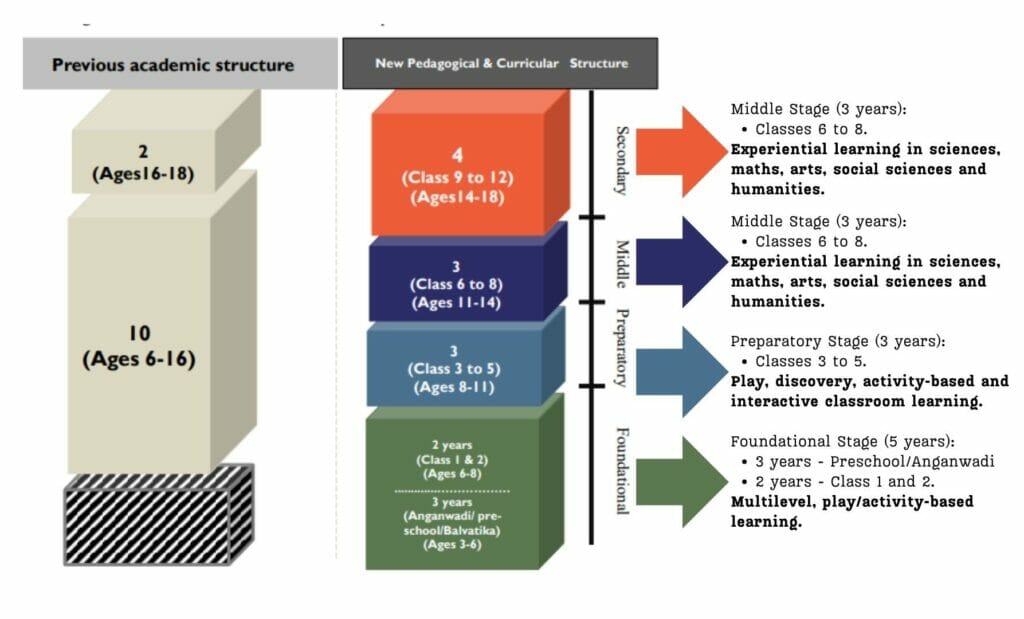Even as the Maharashtra government announced the implementation of the National Education Policy 2020 in the state, parents and educators are confused about age criteria for entry into primary schooling.
One of the major concerns that parents have expressed is about the new age criteria. According to the old criteria, in order to be admitted to nursery class, the child should have completed 2 years and 6 months by the month of June of the academic year. But the new criteria requires the child to have completed 3 years for the same.
Similarly, for class 1, the minimum age for admission was five years and six months, which is now six years according to the NEP. So, parents of students falling in the age group of having completed five and a half years but not completed six years, are concerned children would have to repeat another year in preschool.
The government clarified that NEP implementation will not affect the older students, who have to appear for Class 10 and Class 12 exams in the coming academic year. However, it is the fresh admissions in preschools (nursery and kindergarten) or primary schools (class 1 onwards) that might be affected.
The problem of minimum age
Although the NEP will be implemented in schools starting next academic year (2024-25), many schools have already applied the new criteria for their admissions this year.
There is another issue to be addressed. Children, who had already taken admission before the application of this criteria, remain uncertain. “My son is in KG (kindergarten). He was born in September. So, he won’t complete six years by June next year. We don’t know if we have to repeat a year for him,” says Malini.
Schools say that they have not received any clear notification from the government as to what is supposed to be done in this regard. “So far, there is no clarity about what needs to be done. Our school (a state board school) has not received any notification from the government about any change”, says Aarti Gera, a teacher at a state board school. When this correspondent visited a few schools before reopening of the schools, none of the officials were willing to speak about the implementation as of now.
When Citizen Matters contacted the Secretary, School Education Department, Government of Maharashtra, an official informed that students of kindergarten, who do not meet the new age criteria, will have to wait till they are eligible to enter class 1, that is, they will have to repeat a year (one of the kindergarten classes) before they complete 6 years of age and enter class 1.
States like Karnataka have given a relaxation of two years for the age rule so that children, who already in the schooling system, do not have to repeat a year. It is unclear if the Maharashtra government will take similar steps.
Read more: Schools struggle as pending RTE reimbursements run into crores
What else will change?
Although there is no clarity on how schools will implement NEP, changes is the pedagogical and curricular structure are inevitable. The prevalent 10+2 structure includes classes 1 to 12, excluding the three years of kindergarten. The new 5+3+3+4 structure, according to the NEP, will include nursery, LKG and UKG classes.

NEP also includes vocational training for classes 9 to 12 with training in a minimum of one vocation and more, if the students are interested. These subjects will be given equal importance as other main subjects.
Medium of instruction
Emphasising on the power of language and multilingualism, the NEP says the medium of instruction till class 5, or preferably till class 8 will be the local language, regional language or mother language.
Overall, the National Education Policy 2020 claims to provide students with a holistic and flexible learning experience, by focusing on 21st-century skills like analytical and critical thinking, experiential learning, and creativity.
Few states like Karnataka, Madhya Pradesh, Uttar Pradesh, Telangana and Andhra Pradesh have already started implementing the policy in a phased manner. Maharashtra would be starting this year.
Success of NEP, which has been praised and criticised by various groups, depends on various factors such as teacher training, infrastructure for educational institutes, preparation for students. As of now, parents of young children, would be relieved if they received detailed guidelines from the government and the schools alike.
My daughter age is 14 Apr 2019. I m requesting for continuing his admission in class UKG during academy session 2024-2025